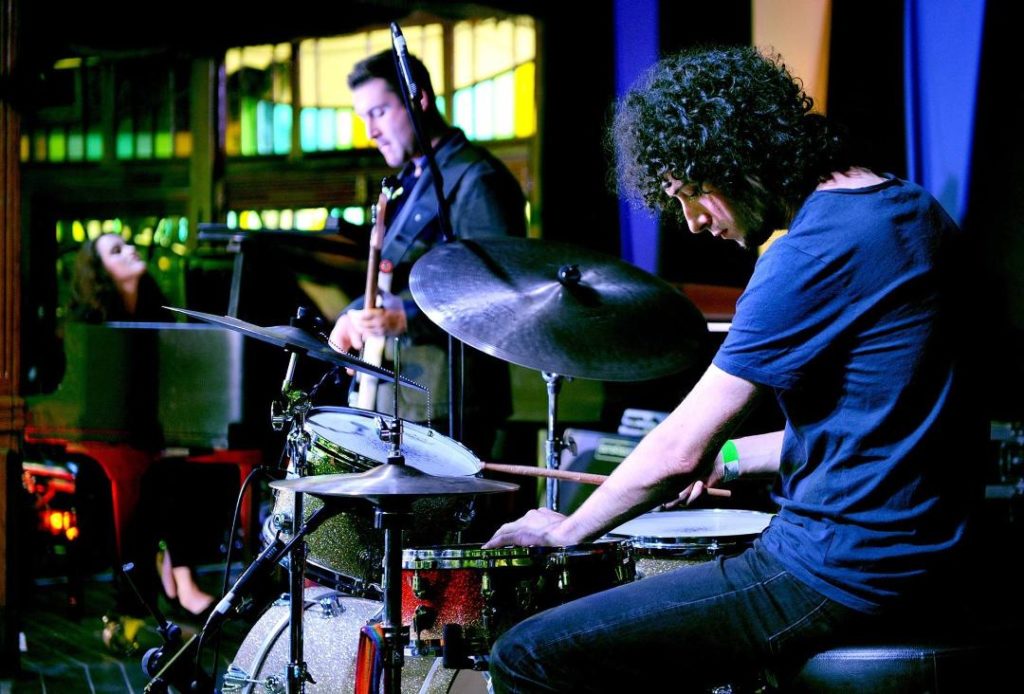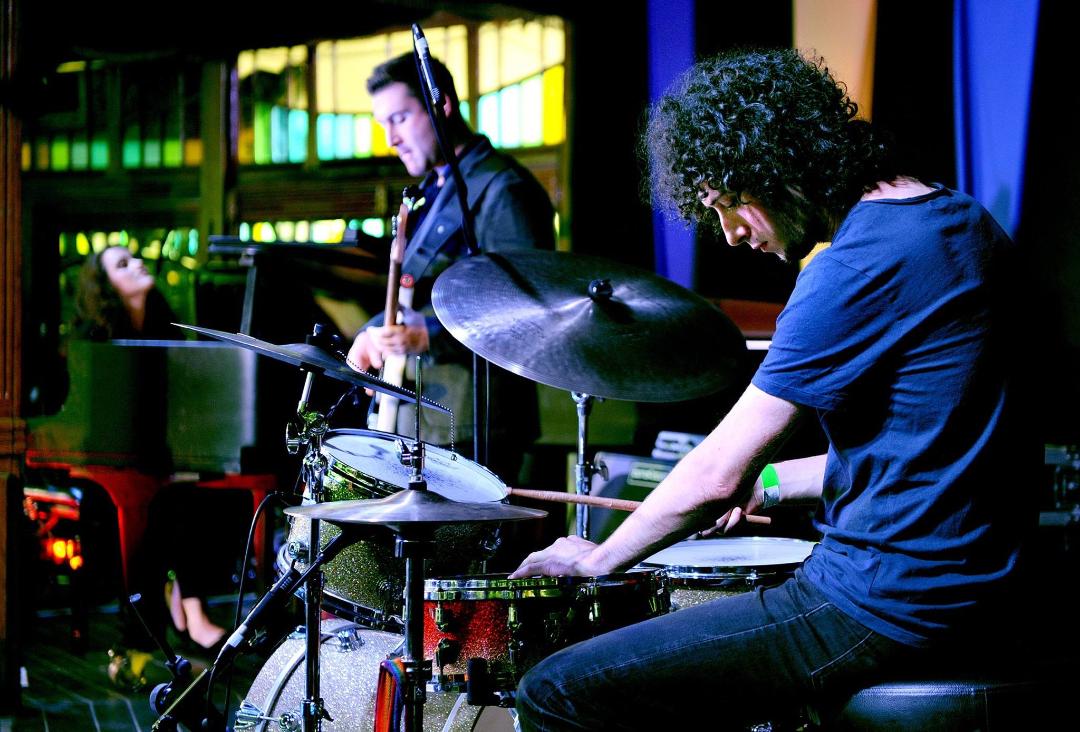At twenty-seven years of age, British drummer Jamie Murray has been described in Rhythm –the biggest and best-selling percussion magazine in the UK- as the drummer to watch in 2018. In addition to his constant collaboration with great musicians of the national and international jazz scene, this autumn he will participate in the London Jazz Festival with his project Beat Replacement. The album -recorded at the West London studio Eastcore- will go on sale in February.
Interview by
Ana Rivadulla Crespo and Adelaida Monguillot
Kate Mills (English Edition)*
Published originally in Spanish at La Tundra Issue 29
Jamie’s early childhood took place in the ’90s in Northern Ireland, in a context that he remembers as socially difficult and in which, due to family needs, he had to change schools several times: «I’ve always been around hardworking people who had to suffer quite a bit to make ends meet. I believe living in this kind of environment, traveling and going to many different schools, gave me a foundation to be able to adapt myself quickly to new things as well as doing the best I could in any situation.»

Of an English mother and Scottish father, Jamie appreciates the effort of his parents to take the family forward and he feels his identity as a source of constant flow. He does not like the question ‘Where are you from?’. For Jamie, nationalist pride limits development. He prefers to be nourished by the cultures that inspire him: «In my opinion, you must take the essence of each culture, use it and mould it to be able to express yourself honestly and become the person you want». Jamie trusts that society will eventually adapt to the new, good or bad. However, he admits to feeling very upset and worried about the impact that Brexit is having on the perception that many of his foreign friends are having towards the English in society. «As humans we are always growing and if we limit ourselves by set rules and set patterns, we stop growing. Dividing is never good. Brexit is useless for a broader vision of what life can be. It’s definitely a step backwards in time.»
At age eleven, when he had to transition to secondary school, his family moved to the county of Kent. One day he saw another student play the drums: at that moment the course of his life changed forever. «I reacted immediately. I remember saying: ‘I’m going to be a drummer’, and that’s exactly what I did.»
Before that day he had never considered being a musician or playing an instrument. Being a very sensitive child and with a great need for expression, fortunately he found in adolescence the way to channel his emotions and express his creativity: «Music helped me transcend what I could not say», he acknowledges with great satisfaction.
Jamie came to live in London at the age of sixteen with the dream of becoming a professional drummer: «To live here you have to have a goal. London, for me, means: ‘Are you ready?’.»
After eleven years in this city he assures that it has not been easy and that he has gone through moments of weakness and doubt. He admits that life in London can get stressful, and that he needs to stay balanced in order to continue living here. He believes that working daily for his dream, playing regularly, composing and learning from the musicians he admires, has helped him to forge a name and to succeed. He also considers that because he came from a family without musical references, he had to open his own path and, with perseverance, he has managed to play almost every night of the week in places of great prestige such as Ronnie Scott’s, The Crypt in Camberwell, the Vortex, the Jazz Café, and the 606 Club.
Jamie considers himself an ‘improviser’. His musical influences during adolescence were mainly electronic music and DnB, but at twenty he discovered jazz, his great passion: «For me, jazz means not lying to yourself; it represents freedom.»
The last project of his creation is called Beat Replacement. In it he composes and plays the drums, but he is also accompanied by internationally renowned musicians such as Zhenya Strigalev on saxophone and electronics, Kevin Glasgow on electric bass, David Preston on electric guitar, and Tomasz Bura on keyboards and synthesizers. «We are all on the same page musically, so it’s very natural for us to just get into a room and play. We can trust each other enough to know that something will come out from that, a really beautiful feeling.»
Jamie is also concerned about the lack of musical awareness in society: «I feel that we live in the age of mediocrity because people want a quick fix for everything and because there are many people who are championed for the wrong reasons». It worries him that nowadays incredible talented musicians live in the shadows most of the time, while society consumes shows of the X-factor type.
«Many of today’s famous cannot be called musicians, it would be an insult to those who came before and who shaped our world with the most beautiful music that ever existed. They had a very high aesthetic conception and musical understanding that now is not valued as before». Jamie shares the influence of his family education by offering possible solutions to this lack of quality: «We need a reality check, to value what requires great effort to get, and to be properly informed and educated in the right direction.»
With great enthusiasm he recommends to the readers of La Tundra Magazine John Coltrane’s latest album: Both Directions At Once: The Lost Album (2018). Recorded on March 6, 1963, in the Van Gelder studio for the label Impulse!, it was lost and was recovered by the family of his first wife (Juanita Naima) and published fifty-five years later. In this album, Coltrane plays with his classic quartet: McCoy Tyner on piano, Jimmy Garrison on double bass and Elvin Jones on drums (for whom Jamie feels a special admiration).
Jamie would have loved to see John Coltrane live: «When I listen to Coltrane I feel like entering a temple and praying». He adds with emotion: «In his music you can find the most evil sounding stuff, not because he is evil, but because he wants to express to the world the pain he lived in, a very racist and harsh world. Coltrane cries through his instrument and, although he can sound dark, he controls it through his inner light; at least, that’s what I hear in him. A true artist and a legend.»
Ana Rivadulla Crespo (Spain). She lives and works in London as a Child and Adolescent Psychiatrist and as a Psychodynamic Psychotherapist.
Adelaida Monguillot (Argentina). She lives in London and is the guitarist of the trio @3argentinas
Kate Mills (United Kingdom) English Editor. She lives and works in London as a Child and Adolescent Psychotherapist.
